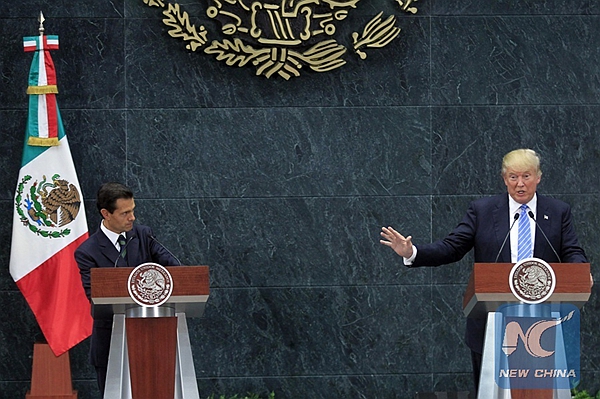Trump's Mexico policy and potential benefits for China
china.org.cn / chinagate.cn by George N. Tzogopoulos, February 13, 2017 Adjust font size:
|
|
|
U.S. Republican presidential candidate Donald Trump (R) addresses a joint press conference with Mexican President Enrique Pena Nieto (L) after their meeting in Mexico City, capital of Mexico, on Aug. 31, 2016. [Xinhua] |
U.S. President Donald Trump is reconsidering the framework of his country's bilateral relations with several countries. Mexico has been one of his top priorities. As a presidential candidate he promised to construct an "impenetrable, physical, tall, powerful, beautiful, southern border wall." He also visited Mexico City on Sept. 1 2016 and - in spite of his relatively mild tone in comparison to his domestic speeches - he referred to the construction of the wall during his press conference with Mexican President Enrique Pe?a Nieto. But Trump and Nieto soon started to disagree on who would pay for the wall. While the former asked Mexico to do so, the latter rejected any such possibility.
The issue came to the forefront after Trump's inauguration. A meeting with his Mexican counterpart was cancelled after their disagreement on the payment of the wall. Nieto declared in a televised speech to the Mexican people that "Mexico will not pay for any wall" and Trump announced his possible intention to impose a 20 percent tax on imports from Mexico.
The whole discussion about the construction of a wall is rather vague for the time being. That is because a barrier, though not a single continuous structure, already exists. It is therefore questionable whether a new fence will be built or the already existing one will be expanded. It is also not clear how any construction activity will deal with the factor of geographical morphology along the 2,000-mile border. In a final account, critical problems - such as illegal drug trading - will arguably not be stopped with the erection of a wall, as smugglers will be perhaps able to dig and normally continue trafficking.
Τrump's approach vis-à-vis Mexico is not only centered around the southern wall but also around other issues, such as trade and the North America Free Trade Area (NAFTA). The U.S. president sees a trade deficit for his country as anathema and is prepared to drastically act in order to reduce it. According to recent data from the U.S. Census Bureau, U.S. exports to Mexico from January until November 2016 amounted at $211,848 million and imports amounted at $270,647 million. Τhis means that - in the eleven months of 2016 - Washington had a trade deficit of $63,191 million. More importantly, this deficit has grown in recent years. It was $60,662 million in 2015, $55,408 million in 2014 and $54,601 million in 2013.
Trump's emphasis on protectionism and his will to renegotiate NAFTA - under unknown terms - pose a serious threat to Mexico's export strategy. According to research conducted by the International Business Center of Michigan State University for 2015, 81.32 percent of Mexican exports have the U.S. as their destination. Canada follows with only 2.77 percent. This means that the country and its companies will suffer serious losses should Trump remain adamant on his position.
Mexico is attempting to overcome the problem via constructive diplomacy. Taking into account the new U.S. president's unpredictability, however, it is also looking for alternatives. China could certainly be one of them. According to the aforementioned research, it accounts for only 1.28 percent of Mexican exports. The room for improvement is obvious.
The intention of both sides to work together and improve their bilateral relationship has been strengthened since June 2013, when President Xi Jinping and Nieto decided to bring it to the level of a comprehensive strategic partnership. During his China visit in September 2016, for instance, the latter briefed Chinese journalists on the rising number of Mexican products reaching the country.
In an article published three months later, Mexico's Deputy Minister of Foreign Affairs Carlos de Icaza Gonzalez praised the "increasingly successful" relationship and characterized "the Chinese market increasingly more important for Mexico and (its) global companies." Subsequently, 2016 and 2017 will perhaps see the aforementioned percentage rise.
Last but not least, the future evolution of relations between the U.S. and Mexico might affect China not only in terms of trade policies and new business opportunities but also with regards to new diplomatic approach to international affairs. As long as Trump does not value traditional cooperation with his country's partners - in this case Mexico - it will be a natural consequence for those partners to respond to new developments and explore how they can regain lost confidence. China, a country significantly interested in North and South America, could offer an alternative friendship, which will not necessarily replace but will certainly complement the U.S. role.
George N. Tzogopoulos is a columnist with China.org.cn. For more information please visit:
http://www.china.org.cn/opinion/GeorgeNTzogopoulos.htm
Opinion articles reflect the views of their authors, not necessarily those of China.org.cn.
